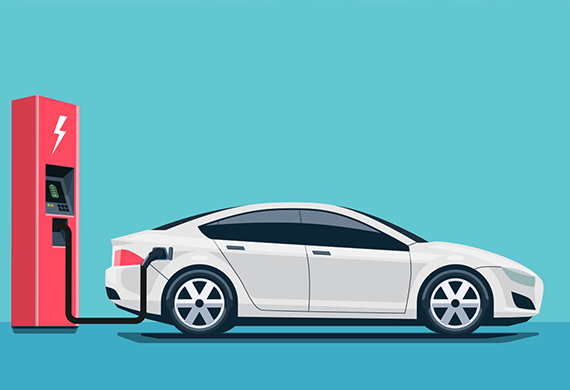Publish Date: December 6, 2021
Towards a Cleaner Environment
EV@IITD

The Centre for Automotive Research and Tribology (CART) at IIT Delhi was established in May 2019 with a vision to promote interdisciplinary research in the area of Electric Vehicle (EV), energy storage and other relevant areas. The centre envisages strong networking and collaboration among various academia, industries, research labs in India and abroad to carry out cutting edge research.
Prof B K Panigrahi, Head of CART talks to Vanita Srivastava on the new course being started on electric vehicles, research on EVs done by the Centre and more.
Edited excerpts:
Why is electric vehicle important in the current scenario? What are the main challenges?
The automotive industry in India is in the process of transformation from the traditional IC engine-based vehicles to electric vehicles to reduce the environmental impact due to pollution, dependency on traditional fossil fuel based energy sources etc. Ministry of Heavy Industries and Public Enterprises, Government of India had launched FAME (Faster Adoption and Manufacture of (Hybrid and) Electric Vehicles (EVs)) scheme to incentivize the production and promotion of eco-friendly vehicles including electric vehicles and hybrid vehicles. Various state governments have announced their EV policies to encourage and promote the adaptation of EVs for public and private transportation.
Despite all the efforts at various levels, the faster adaptation of EVs in India is still encountering greater technical challenges relating to range anxiety; charging infrastructure; cost; repair; maintenance. In particular, a major challenge is the skilling and re-skilling of the personnel associated with the EV industry because of the transition from the IC engines to the EVs.
How has the trajectory been on the course started on electric vehicles? Any new courses that are in the pipeline?
To address various issues related to the EV domain, CART is going to start a new M. Tech course on Electric Mobility from the current academic session. The course structure and the detail course contents have been developed after a wider consultation with various academia and industry experts in EV domain. CART will be offering courses from diverse domains of EVs. To highlight few of the areas are multidisciplinary aspects of batteries, EV Charging station and infrastructure, power electronics and drives for EVs, connected and autonomous vehicles, vehicle telematics, embedded system for automotive, connected and autonomous vehicle etc.
CART is also committed to impart training in the EV domain through workshops; online certification course; and continuing education programs. Further, CART is collaborating with academia, industry, government and policy planning bodies on various aspects pertaining to the research and development in the EV domain. In future joint degree programs with other Institutes can also be explored.
What kind of research has been done in the field of Electric vehicles by your center and what are the plans for the coming months?
The core and associated faculty of the Centre are actively involved in the following research domain in the field of EVs.
Power Electronics and Drives for Electric Mobility: The focus is on the design and development of high-power density power electronics converters, onboard chargers, machines for electric vehicles, power train technology and various controllers for drives and converters. Development of various novel control algorithms for converters and motor drives is one of the key focus at present. The future plan is for the development of fuel cell-based electric buses in association with various industry partners.
Charging Infrastructure: A great emphasis is given for the design and development of Level1, Level2 chargers, Fast DC chargers, battery swapping stations etc. Researchers are also involved in the development of various intelligent algorithms for the placement of fast charging stations and battery swapping stations in a distribution network. We are also looking into the Grid issues pertaining to the higher penetration of EVs.
Battery and battery management system: In context of batteries, the key areas of research at CART are (a) novel thermal management system for maintaining temperature uniformity among the cells and restrict the rise of maximum temperature above normal conditions; (b) Digital twin based on IoT; sensors; cloud computing; multi-physics modeling and machine learning for real-time monitoring of SoC and SoH of batteries under dynamic discharge conditions;(c) aging controlled fast charging of batteries by evaluation of optimal charging current, and simultaneously optimizing charging time and capacity.
Automotive Health Monitoring and NVH: The thrust of the research is on the development of an intelligent fault diagnosis and prognosis system for electric vehicles and remaining useful life estimation of components of electric vehicles. The research is also focused on the improvement of NVH (Noise, Vibration, and Harshness) characteristics of the electric vehicle by developing strategies for noise characterization, control, and detection of electric vehicles.
Autonomous Vehicles: The modern vehicles come with a myriad of sensors and hence it makes design sense to integrate additional sensors to enable autonomy, starting from systems for lane departure to parking assists to complete driverless platoons. The research focus is mainly to enable sensor fusion to enable perception, developing embedded system with safety properties running millions of codes in an autonomous EV system. Close collaboration with faculty in CSE, ME and EE working in the area of Robotics, embedded systems and AI/ML will lay the foundation for a strong research program in autonomous vehicles.
Can you please brief about the environmental friendly electric vehicle-charging station
Moving towards carbon-neutral society, the large-scale integration of EV into the grid will greatly increase the electricity consumption in the grid, which require expensive grid reinforcement. Moreover, electric vehicles are not sustainable if their power supply systems are dominated by fossil fuels. Integration of PV with EV charging infrastructure is a promising way for sustainable EV charging with minimal grid impact.
Great research emphasis is given to develop fast charging protocols that optimizes battery cyclic stability and minimize the charging time simultaneously. Optimal scheduling of EV charging under limited power availability, optimal use of available renewable energy for EV charging with minimal dependency on Grid, Ancillary service for Grid support are key areas of research focus.

